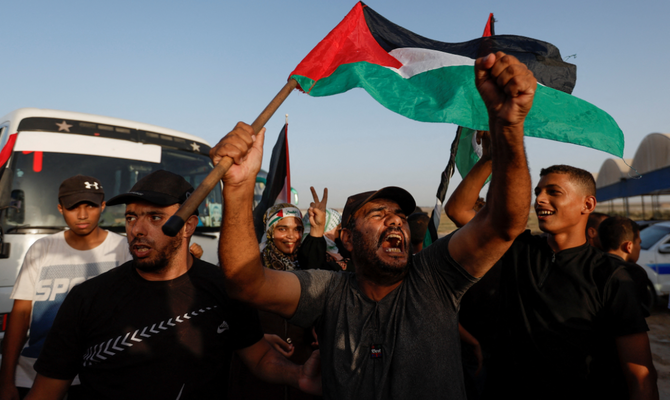Tension escalated at Al-Aqsa Mosque compound on Monday, with incursions into the area by hundreds of Jewish settlers, under the protection of Israeli police, to mark the start of Rosh Hashanah.
It came as Jewish extremist groups continued calls to be allowed to enter the compound on Monday and Tuesday to celebrate the Jewish New Year.
Ambassador Haitham Abu Al-Foul, spokesman at the Jordanian Ministry of Foreign and Expatriate Affairs, called on Israel to put a stop to the settlers’ activities and respect the sanctity of the compound and the authority of the Jerusalem Awqaf Administration in line with international law.
Israel occupied East Jerusalem, home to over 350,000 Palestinians, in 1967, but Al-Aqsa Mosque compound and the Church of the Holy Sepulchre are under Jordanian guardianship.
On Monday morning Israeli police placed a cordon around Al-Aqsa, preventing the entry of young people under the age of 40 and stopping all noon prayers, as around 335 Jews toured the compound.
Five Palestinians were injured by police at the Lion’s Gate, according to the Palestinian Red Crescent. They were taken to Al-Makassed Hospital. Worshippers — including women and children — performed noon prayers at the doorsteps of the mosque instead.
Israel imposed a complete closure on the West Bank and Gaza Strip crossing late on Sunday afternoon in conjunction with Rosh Hashanah over fears of escalation. The state of alert will continue until the end of the holiday.
Many Palestinians fear that Israel will introduce a division of use of Al-Aqsa, as happened with the Ibrahimi Mosque in Hebron, allowing both faiths access, but closing it to the other during specific holidays.
The Palestinian presidency condemned the escalation at the compound, warning that continuation would lead to potential violence.
Nabil Abu Rudeineh, spokesperson for Palestinian Authority’s presidency, stressed that the Palestinians would not allow Al-Aqsa Mosque to be damaged or desecrated in any way, and would stand against the occupation.
The Palestinians claim the mosque has become a scene of political strife with the approach of the Israeli elections on Nov. 1, with major right-wing Israeli parties competing to win more votes from the right by allowing access to the compound.
The Arab League condemned the storming of Al-Aqsa, holding the Israeli government responsible for igniting the situation.
The spokesman for the league’s secretary-general, Jamal Rushdie, said in a press statement that the storming of Al-Aqsa and the arrest of several Palestinians inside was aimed at imposing a temporal and spatial division in the mosque, changing the existing historical and legal situation.
This continuous policy on the part of the occupying government represents a flagrant violation of international law, and provokes Palestinians and Muslims in general, he added.
Rushdie said that the intensification of incursions ahead of the Jewish holidays adds to the state of tension that already exists in the occupied Palestinian territories, especially in Jerusalem.
He said that imposing a siege on Al-Aqsa and arresting those stationed inside it is an unacceptable crime.
Rushdie called on the international community to assume its responsibilities and confront this dangerous Israeli escalation.
Tension is expected to continue until the end of the holidays on Oct. 17.
Israeli authorities issued warnings about the potential for violence in the coming days against Israeli citizens, after announcements made by Fatah and Hamas calling on Palestinians to oppose Israelis approaching Al-Aqsa.
“There is a clear increase in alerts about plans to carry out attacks, and the police are responding to the threat of deploying large forces,” said Israeli Police Commissioner Yacov Shabtai.
Thousands of Israeli police will be deployed at roadblocks, shopping centers and entertainment venues, synagogues and crowded sites across Israel.
According to the Yedioth Ahronoth newspaper’s website, the Israel Defense Forces currently have at least 25 battalions in the West Bank to enhance security during the Jewish holidays.
Hundreds of IDF members and police are also deployed in the Jerusalem area, as well as inside Old Jerusalem and on the roads leading to Al-Aqsa Mosque.
Fatah called on Palestinians to confront extremist Jewish groups and stop settler incursions into Al-Aqsa Mosque and its courtyards, and to prevent them from performing prayers, blowing trumpets, offering sacrifices, or marching.
Hamas, too, called on the Palestinian citizens of the West Bank, Jerusalem, and inside Israel to stand against the settlers.
“We need the greatest Arab and Islamic support at all levels for the Palestinian people and the holy sites, so that we can protect Jerusalem and defend the blessed Al-Aqsa Mosque with all the tools of struggle,” said Hamas spokesperson Fawzi Barhoum.

